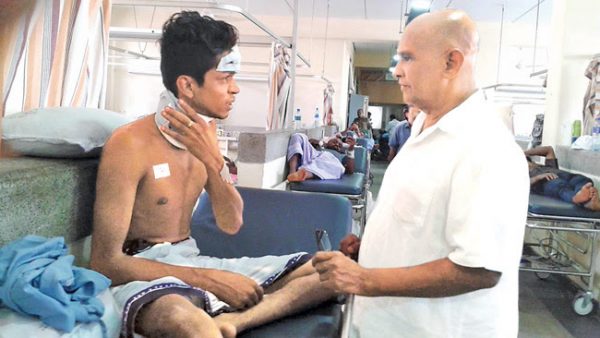Colombo, July 27 (NIA): The sober media coverage of a recent Jaffna University fracas in which Tamil and Sinhalese students violently clashed over the organization of an annual event, indicates that a “pro-reconciliation” sentiment has gained “moral currency” in Sri Lanka, says Verite Research in its analysis of the way the government, political parties and the media reacted to the incident of July 16 and its aftermath.
“In the post-2015 context, calls to desist from inciting racism have gained a degree of moral currency in the press. This development reflects the media’s reorientation to shifts in political power balances and priorities in light of the post 2015 transition. The moral currency of a pro-reconciliation position has hence served to mute the influence of nationalist arguments in press discourse,” the Colombo-based private research organization says.
Sinhalese students who wanted to present a Kandyan dance, were assaulted by Tamil students because of a difference of opinion over whether the dance item could be accommodated in the way the Sinhalese students wanted at the last minute. The wounded Sinhalese students were hospitalized ,with one being flown to Colombo, and the rest were transported to Vavuniya, though eventually, they were brought back at the intervention of higher authorities in Colombo. Apparently, government feared that the students’ arrival in the capital might trigger an anti-Tamil riot of the one the city saw in 1983.
But the government’s fears proved to be unfounded because, post-2015, the mood in Sinhalese-speaking South Sri Lanka had shifted in favor of non-aggression and reconciliation, as Verite Research points out.
Lankadeepa, the largest circulated Sinhalese daily, said in an edit: “We are divided by language and religion. However, what supersedes all this, is humanity. Only a barbarian can ignore this truth.”
The Sinhalese nationalist Divaina said in its edit: “We should never repeat the “Black July” which was the most brutal tragedy in Sri Lankan history.”
“It is the responsibility of the nation to prevent any recurrence of such an incident,” said Rivira.
Attributing the incident to a “racist” minority among the Tamils and Sinhalese, the Sinhalese paper Mawbima said: “It was a pleasure to see that the electronic media did not report the incident in a way that spreads racism. But the racists in the south would spread racism making use of the incident. They are accused of having a strong racist tendency, but the racists in the north are not different from the racists in the south. They will use the incident for their narrow agendas as well.”
However, Verite Research noted that the media coverage lacked depth from the point of the minority perspective, for example, the coverage had not taken note of the effects of Sinhalese students being close to the army stationed in Jaffna.
Expectedly, the Joint Opposition and the hardcore Sinhalese nationalist press, attributed the incident to aggression by ‘extremist’ Tamil students and the government’s perceived conciliatory approach towards the Tamil community.
The Sinhalese nationalist Jathika Hela Urumaya (JHU), a partner in the coalition government, tied up with the Joint Opposition in denouncing the perceived unwillingness of Tamils to appreciate Sinhalese ‘sacrifices’ for reconciliation and “great Sinhala traditions.”
By portraying the incident as victimization of the Sinhalese by Tamil terrorists nationalist voices were able to escalate the issue into a national debate, resulting in a break from typical coverage of student clashes, Verite Research said.
But it also noted that there were condemnations of nationalist incitement over the incident and reconciliation was touted as the need of the hour.
This view was expressed by the President, Prime Minister, cabinet ministers, opposition parties such as the Janatha Vimukthi Peramuna (JVP) and the Tamil National Alliance (TNA), and several mainstream and alternative newspapers.
“The government’s approach was to downplay the ethnic dimension of the clash and emphasize the need for non-recurrence of such incidents in light of the 2015 transition,” Verite Research underscored.
President Maithripala Sirisena said that universities should foster reconciliation and not divisiveness, and proposed that reconciliation should be made part of school curricula. Prime Minister Ranil Wickremesinghe wowed not to allow the incident to escalate and sent Tamil National Alliance (TNA) leader Mavai Senathirajah to defuse the situation.
The Janatha Vimukthi Peramuna (JVP) said in a press release: “The unfortunate incident at the University of Jaffna should not happen anywhere. Racist attacks should not be allowed in a country that suffered endlessly from a meaningless war. National peace is the only response to racism and yet the government has not been able to win the hearts of the Tamil youth yet. This attack provokes the racists in the South who exclusively use racism for political gain. We believe that the students’ movement should intervene to douse the conflict rather than fuelling it. We, as a party, will intervene in it.”
The TNA too wanted to douse the fire. It issued a statement saying: “We deeply regret the incident that took place at the University of Jaffna. We would like to invite the Sinhala students to return to the university. We were shocked at this unfortunate incident. It is sad that incidents of this kind take place, when we are urging the government to address the Tamil people’s grievances. It may give an opportunity to the groups which are trying to portray this as a Sinhala-Tamil conflict. We will lend our support to prevent such incidents.”

























































